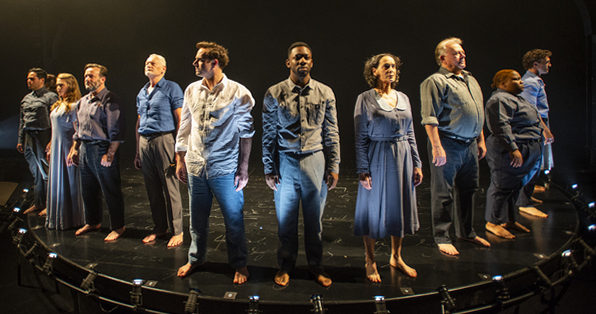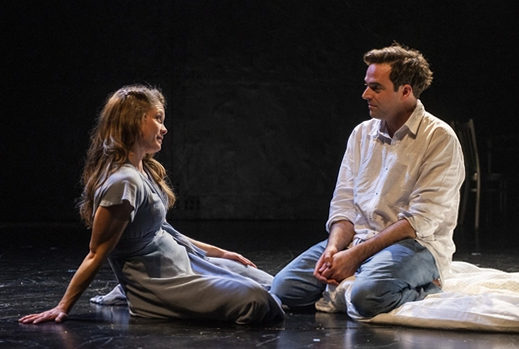
2 ½ stars
Free-Style Chaos Defines Augie March
This theatrical version of “The Adventures of Augie March,” at the Court Theatre perhaps serves to illustrate why the popular novel by Chicagoan Saul Bellow has never before been adapted to the stage.
The story line basically follows everyman hero Augie March (Patrick Mulvey) as he meanders aimlessly through life allowing the people he meets to shape his journey. In this way Bellow suggests the arbitrariness of life and is perhaps a cautionary tale of the dangers of undefined goals.
The play opens in the Atlantic Ocean with Augie and his maniacal companion (John Judd) floating in a lifeboat after the sinking of their merchant ship.
During a flashback, Augie’s odyssey begins in the 1930s depression era crowded apartment he shares with his mother (Chaon Cross), two brothers and an overbearing Russian Jewish grandmother (Marilyn Dodds Frank).
Along the way Augie meets an odd assortment of characters which is one of the hallmarks of Bellow’s writing as he reveled in the peculiarities and idiosyncrasies of humanity.
Luigi Sottile was convincingly conflicted as brother Simon and Travis Turner thoughtfully portrayed “idiot” brother George. Chaon Cross was wonderfully engaging as the rebellious socialite Thea who encourages Augie to live a different reality and BrittneyLove Smith totally channeled the petty gangster-like, billiard hall manager, Dingbat.
The story continues through post WWII but the material seems dated rather than historical.
The play includes one beautifully sung “Sabbath Prayer” as well as a smattering of recorded background music. There are also a few modern dance numbers and a significant amount of interesting stylized movements by Erin Kilmurray that unfortunately all together seemed well conceived but haphazard.
Bellow’s chaotic style when published in 1953 no doubt had a cutting edge freshness that this production lacks. I could not help thinking that I have seen most of these minimal effect theatrical techniques before.
My resulting impression was that this seemed like an idea that Pulitzer Prize-winning playwright David Auburn has been thinking about for decades and that he has finally been able to realize.
This is further exacerbated by what seems to be a decision by director Charles Newell to stage it as a period piece that would be perfectly comfortable and even provocative to a 1960’s audience.
Twelve identical wooden chairs and four sturdy tables were rearranged as needed to set each scene. These were expertly manipulated by the cast demonstrating that Newell is comfortable with this genre of stagecraft.
The scenic and lighting design by John Culbert had a simple elegance featuring an imposing steel riveted proscenium arch evocative of an iconic Chicago elevated structure or river bridge. His use of light and fog creating streaming canopies of light helped to focus attention to various areas giving a sense of place on an otherwise bare stage.
Sally Dolembo’s costume design had a conceptual generic quality that fit the aesthetic vision. The dress worn by Augie’s lover, Thea, used a long wrapping sash that interestingly transformed the garment from dress to gown and was a stroke of brilliance.
The use of silhouettes and shadow puppetry by Manual Cinema Studios was very effective, particularly in the boxing sequence, and the audience was delighted by the imagery of the iguana hunt even if it did go on a bit too long.
The printed program fails to mention that this show has three acts, leaving a portion of the audience somewhat perplexed at the abrupt ending of Act Two.

Bellow’s psychological and philosophical musings are no doubt interesting to read but present a significant challenge as theatrical dialogue or even soliloquy.
Augie’s theme which defines his character is repeated three times throughout the play as the hero struggles to explain his existence.
“I am an American, Chicago born—Chicago, that somber city—and go at things as I have taught myself, free-style, and will make the record in my own way: first to knock, first admitted; sometimes an innocent knock, sometimes a not so innocent. But a man’s character is his fate, says Heraclitus, and in the end there isn’t any way to disguise the nature of the knocks by acoustical work on the door or gloving the knuckles.”
This paragraph lends itself more to poetry than prose. It requires some time to ponder which the theater does not necessarily provide.
There are other instances of ponderous phrases that may have been effortlessly consumed by the more erudite audience members but I believe a play should be easily understood by the general theater-going public to be viable.
Auburn’s decision to give voice to the voiceless by having two mute characters spontaneously express themselves verbally was one of the more provocative innovations but there is little time to really appreciate what they have to say and is ultimately lost in the overall hectic environment.
This was an outstanding ensemble of actors led by Mulvey who with athletic stamina employed herculean effort to drag this burdensome three and a half hour production to the finish line.
Sometimes the problem with a labor of love is that it becomes difficult to edit due to a reluctance to make the tough cuts. Also, when you have an idea in your mind for a long time it is hard to let go of your initial plan.
This world premiere production of “The Adventures of Augie March” has a lot of good ideas but for me did not come together as a unified whole with a satisfactory ending that is presented in a fresh way.
I liken this to a losing Cubs game where the talented team is hitting the ball, getting on base and even smacking a few home runs but still lose. The fans might be amused at times, there are moments of greatness, but in the end there is a feeling of dissatisfaction and confusion.
For this reason I call this a Somewhat Recommend.
DETAILS: “The Adventures of Augie March” is at Court Theatre, 5535 S. Ellis Ave., Chicago through June 9, 2019. Running time: a few minutes short of 3.5 hours with two intermissions. For tickets and other information call (773) 753-4472 or visit courttheatre.
Reno Lovison
For more shows visit Theatre in Chicago
